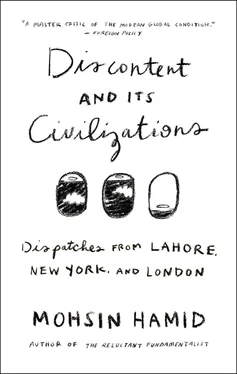Similarly, many millions of Muslims apparently believe that women should have no role in politics. But many millions more have had no qualms electing women prime ministers in Muslim-majority countries such as Pakistan and Bangladesh. Indeed, this month’s Pakistani elections witnessed a record 448 women running for seats in the national and provincial assemblies.
Two of my great-grandparents sent all of their daughters to university. One of them, my grandmother, was the chairperson of the All Pakistan Women’s Association and dedicated her life to the advancement of women’s rights in the country. But among those descended from the same line are women who do not work and who refuse to meet men who are not their blood relatives. I have female relatives my age who cover their heads, others who wear miniskirts, some who are university professors or run businesses, others who choose rarely to leave their homes. I suspect if you were to ask them their religion, all would say “Islam.” But if you were to use that term to define their politics, careers, or social values, you would struggle to come up with a coherent, unified view.
Lived religion is a very different thing from strict textual analysis. Very few people of any faith live their lives as literalist interpretations of scripture. Many people have little or no knowledge of scripture at all. Many others who have more knowledge choose to interpret what they know in ways that are convenient, or that fit their own moral sense of what is good. Still others view their religion as a kind of self-accepted ethnicity, but live lives utterly divorced from any sense of faith.
When the Pakistani Taliban were filmed flogging a young woman in Swat as punishment for her allegedly “amoral” behavior, there was such popular revulsion in Pakistan that the army launched a military campaign to retake the region. As my parents’ driver told me, “They say they beat her because of Islam. This isn’t Islam. Islam says to do good things. So how can this be Islam?” He offered no complex hermeneutics in support of his position. His Islamic moral compass was not textual; it was internal, his own notion of right and wrong.
I often hear it said, at readings or talks ranging from Lahore to Louisiana, that The Reluctant Fundamentalist is about a man who becomes an Islamic fundamentalist. I’m not sure what that term means, exactly, but I have a reasonable idea about the sentences and paragraphs that are actually present in the book. Changez, the main character, is a Pakistani student at Princeton. When he gets his dream job at a high-paying valuation firm in New York, he exclaims, “Thank you, God!”
That’s it. Other than that exclamation (a common figure of speech), there’s no real evidence that Changez is religious. He doesn’t quote from scripture. He never asks himself about heaven or hell or the divine. He drinks. He has sex out of marriage. His beliefs could quite plausibly be those of a secular humanist. And yet he calls himself a Muslim, and is angry with US foreign policy, and grows a beard — and that seems to be enough. Changez may well be an agnostic, or even an atheist. Nonetheless he is somehow, and seemingly quite naturally, read by many people as a character who is an Islamic fundamentalist.
Why? The novel carefully separates the politics of self-identification from any underlying religious faith or spirituality. It sets out to show that the former can exist in the absence of the latter. Yet we tend to read the world otherwise, to imagine computer software — like religious operating systems where perhaps none exist.
And in so doing, it is we who create the monolith. If we look at religion as practiced in the world outside, we see multiplicity. It is from inside us that the urge to unify arises. A dozen years after 2001, we are perhaps getting better at resisting this impulse. But we still have a long, long way to go.
(2013)
THE AUTHOR IS grateful to the nearly two dozen publications in which the pieces that constitute most of this book first appeared, in slightly different form.
“Once Upon a Life” and “Rereading” both appeared in The Observer . “Art and the Other Pakistans” appeared in Hanging Fire: Contemporary Art from Pakistan , edited by Salima Hashmi and published by the Asia Society in New York. “When Updike Saved Me from Morrison (and Myself)” appeared in The Daily Princetonian . “In Concert, No Touching” appeared in Nerve . “International Relations,” “The Countdown,” “Are We Too Concerned That Characters Be ‘Likable’?” “Where Is the Great American Novel by a Woman?” “How Do E-Books Change the Reading Experience?” “Are the New ‘Golden Age’ TV Shows the New Novels?” “After Sixty Years, Will Pakistan Be Reborn?” and “To Fight India, We Fought Ourselves” all appeared in The New York Times . “A Home for Water Lilies” appeared under the title “I Love This Dirty Town” in The New Statesman. “Down the Tube” appeared in The Independent . “On Fatherhood” appeared in Pakistan’s Paper magazine. “It Had to Be a Sign,” “Enduring Love of the Second Person,” “Osama bin Laden’s Death,” and “Islam Is Not a Monolith” all appeared in The Guardian . “ Avatar in Lahore” appeared in TAR . “Don’t Angry Me” appeared on the website of The New Yorker . “Personal and Political Intertwined” appeared in The Radio Times . “Pereira Transforms” appeared as the introduction to the English translation of Antonio Tabucchi’s Pereira Maintains , published by Canongate. “My Reluctant Fundamentalist” appeared in the “Original Essays” series on the website Powells.com. “Get Fit with Haruki Murakami” appeared in The Atlantic ’s “By Heart” series. “The Usual Ally” and “Divided We Fall” appeared in the US and Asian editions of Time , respectively. “A Beginning” appeared in the Frankfurter Allgemeine Zeitung . “Fear and Silence” appeared in Dawn . “Feverish and Flooded, Pakistan Can Yet Thrive” appeared in The Financial Times . “Discontent and Its Civilizations” appeared in The International Herald Tribune . “Uniting Pakistan’s Minority and Majority” appeared in The Express Tribune . “Why They Get Pakistan Wrong” and “Why Drones Don’t Help” both appeared in The New York Review of Books . Finally, “Nationalism Should Retire at Sixty-Five” appeared in The Times of India .
*Indeed, perhaps more than just words: on July 9, 2011, the US announced it was holding back $800 million of military aid for Pakistan.
*Lieven is careful to point out that his analysis refers only to Pakistan as it has been configured for the past forty years, a territory with “more of a natural unity… [and] a degree of common history and ethnic intertwining stretching back long before British rule,” and not to what he terms 1947–1971’s “freak of history… [with] its two ethnically and culturally very different wings separated by 1,000 miles of hostile India,” a situation from which Bangladesh should have been given a “civilized divorce” but which instead “ended in horrible bloodshed.”












